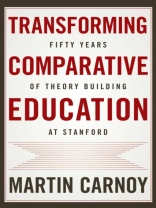Over the past fifty years, new theoretical approaches to comparative and international education have transformed it as an academic field. We know that fields of research are often shaped by ‘collectives’ of researchers and students converging at auspicious times throughout history. Part institutional memoir and part intellectual history, Transforming Comparative Education takes the Stanford ‘collective’ as a framework for discussing major trends and contributions to the field from the early 1960s to the present day, and beyond.
Carnoy draws on interviews with researchers at Stanford to present the genesis of their key theoretical findings in their own words. Moving through them chronologically, Carnoy situates each work within its historical context, and argues that comparative education is strongly influenced by its economic and political environment. Ultimately, he discusses the potential influence of feminist theory, organizational theory, impact evaluation, world society theory, and state theory on comparative work in the future, and the political and economic changes that might inspire new directions in the field.
สารบัญ
1. The Strands of Comparative and International Education:
2. How One Comparative Education Program Managed to Survive and Make Its Mark on the Field
3. The 1960s and 1970s: Human Capital
4. The 1970s: Comparative Education and Modernity
5. The 1970s: Colonialism, Neocolonialism, and Comparative Education
6. The 1970s and 1980s: World Society Theory and Comparative Education
7. The 1980s: The Politics of Education: Legitimation, Reform, and Knowledge
8. The 1980s: The State and Comparative Education
9. The 1990s: Comparative Education and the Impact of Globalization
10. The 2000s: Impact Evaluation and Comparative Education
11. The 2000s: International Tests and Comparative Education
12. Where Is Theory Headed in International and Comparative Education?
เกี่ยวกับผู้แต่ง
Martin Carnoy is the Vida Jacks Professor of Education at Stanford University School of Education. He is former president of the Comparative and International Education Society and is a fellow of the National Academy of Education, the International Academy of Education, the American Educational Research Association, and the Comparative and International Education Society. He has written more than 40 books on economic issues, racial inequality, and education policy, including
Cuba’s Academic Advantage (Stanford, 2007), and
University Expansion in Changing Global Economy (Stanford, 2013).












